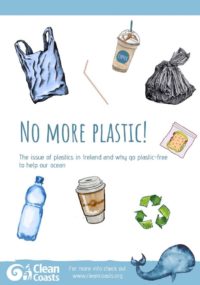How to get involved with Clean Coasts right now
Clean Coasts can count on the incredible work of communities around Ireland who help us tackle marine litter all year around. At the moment, however, things keep changing quickly and there is no pressure on you to do anything, but for all those who asked us how to get involved with Clean Coasts and do something for our ocean under current circumstances, you’ll find a few ideas here.
For Clean Coasts volunteers all around the country, a beach clean is not only a way to take care of our coast but also to meet other members of the community. However, when it isn’t possible to take part in a big beach clean, there are still plenty of things we can do to protect our ocean and marine life right now:
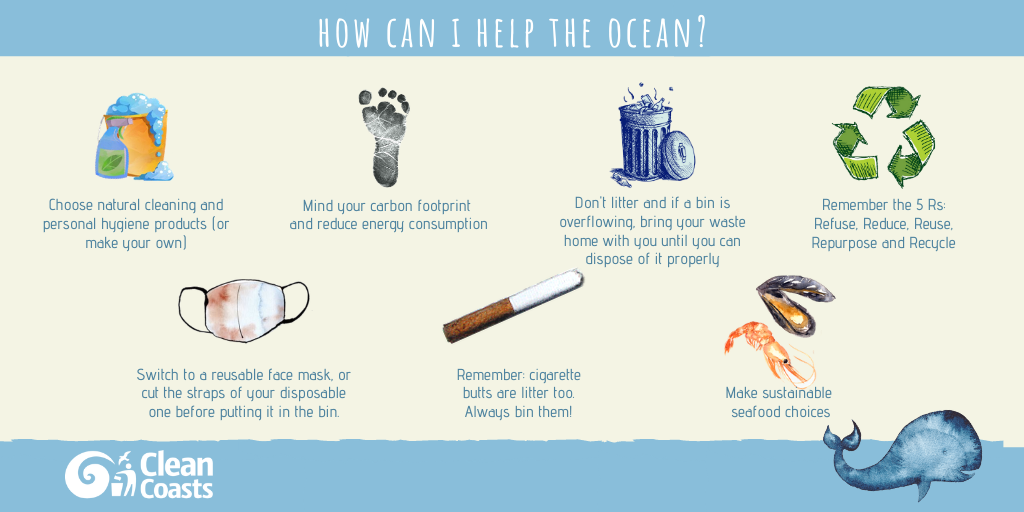
- Don’t litter;
- If a bin is overflowing, bring your waste home with you until you can dispose of it properly;
- Remember the 5 Rs: Refuse, Reduce, Reuse, Repurpose and Recycle;
- Choose natural cleaning and personal hygiene products (or make your own);
- Mind your carbon footprint and reduce energy consumption;
- Make safe, sustainable seafood choices;
- Remember that cigarette butts are litter, so aways pop them in the bin;
- Switch to a reusable face mask, or cut the straps of your disposable one before putting it in the bin.
Have you ever heard about our #2minutebeachclean initiative?

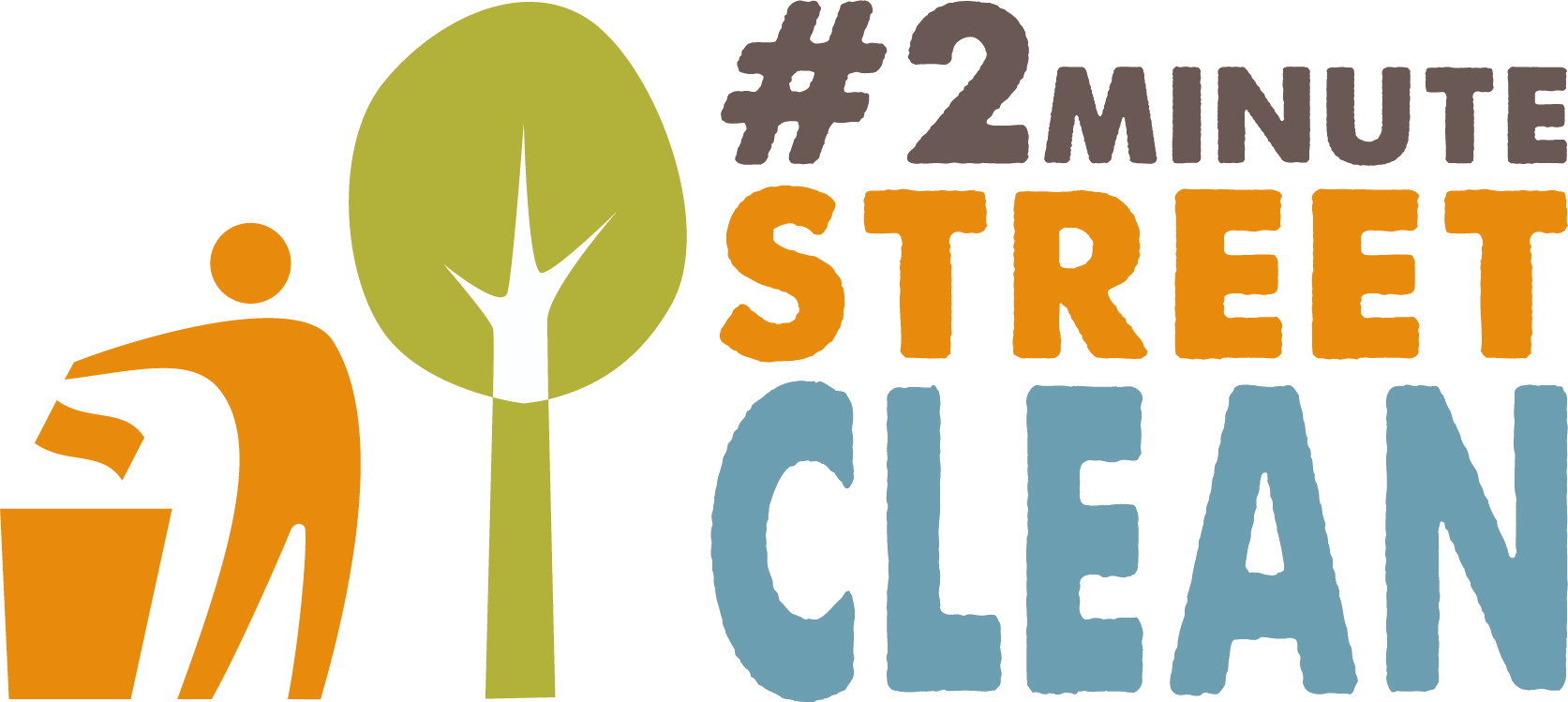
The #2minutebeachclean campaign is a social media campaign designed to inspire people to take action to protect our coast in only 2 minutes. From our recent survey with our Clean Coasts communities around Ireland, it emerges that doing a #2minutebeachclean was a great alternative to organised beach cleans under current restrictions.
But how does it work? It’s as simple as it sounds – The next time you are on the beach, take 2 minutes to:
- Pick up some marine litter you find along the way
-
Take a snap of the marine litter you collect
-
Post your snap on Instagram/Twitter using the hashtag #2minutebeachclean @CleanCoasts or post your picture to our Clean Coast Facebook page including the hashtags in the post – don’t forget to tell us where you took your snapped your shot.
-
Dispose of the waste you collected properly, recycle it/bin it!
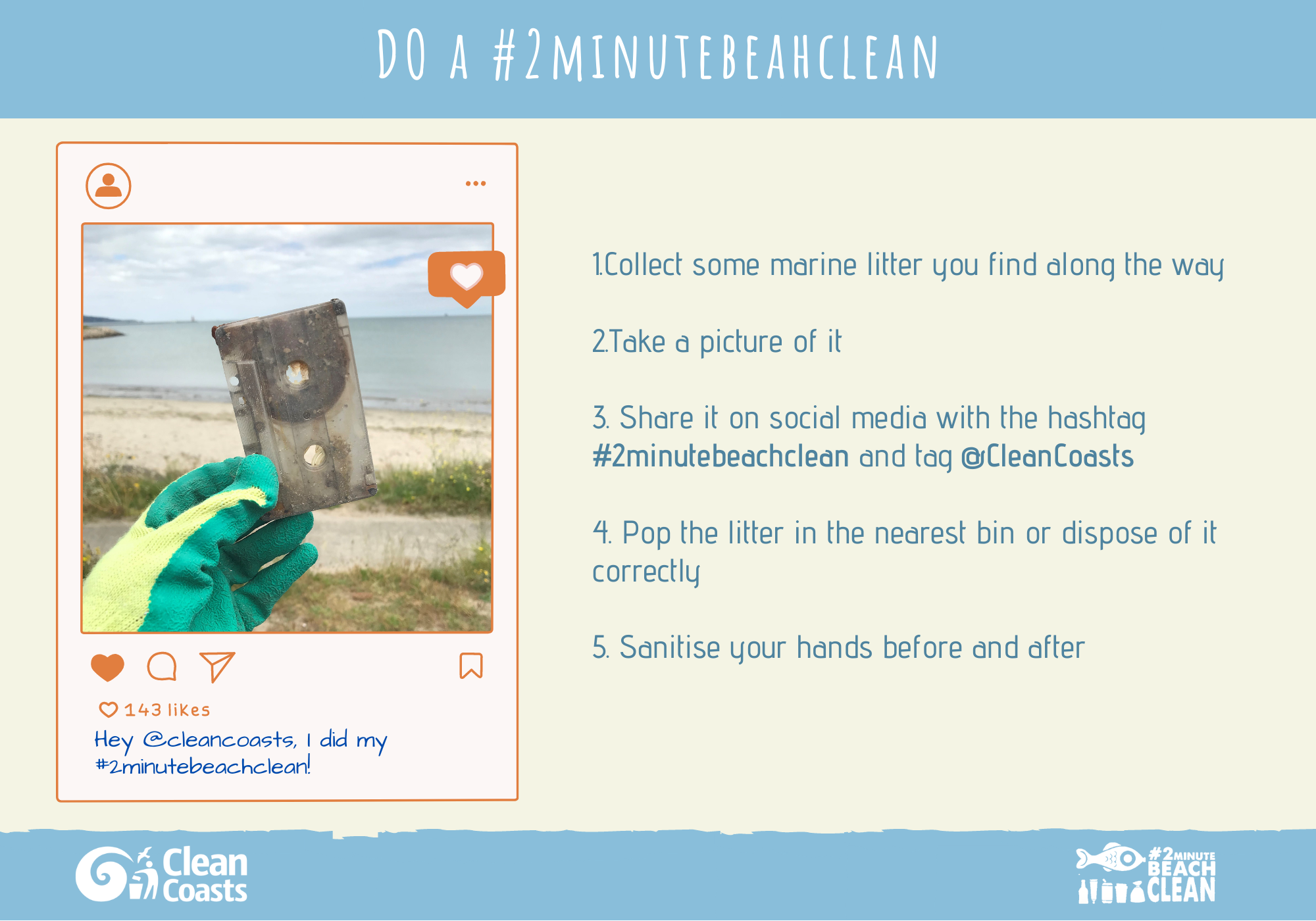
Would like to get involved but you don’t live on the coast or can’t reach it due to current restrictions? No problem – You can always do a #2minutestreetclean!
The number one cause of marine litter is litter dropped in towns and cities, so no matter how far from the coast, your clean up can make a huge difference from our sea and for marine life.
Find out more here.
Always remember to #thinkb4uflush and #thinkb4upour
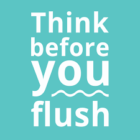 Everyday thousands of wet wipes, cotton buds, sanitary products and other unsuitable items are flushed down toilets in Ireland instead of being put in the bin. This causes costly blockages in our homes, businesses and wastewater systems, ultimately leading to sewer overflows in our communities and plastic pollution in rivers, on beaches and in the ocean.
Everyday thousands of wet wipes, cotton buds, sanitary products and other unsuitable items are flushed down toilets in Ireland instead of being put in the bin. This causes costly blockages in our homes, businesses and wastewater systems, ultimately leading to sewer overflows in our communities and plastic pollution in rivers, on beaches and in the ocean.
Think Before You Flush is a public awareness campaign about the problems these items can cause in our marine environment and our wastewater systems if they are flushed. The campaign is supported by Irish Water. The Think Before You Flush campaign invites you to join us in making small changes in your bathroom behaviour like never using the toilet to dispose of wet wipes and other sanitary products and to use a bin instead.
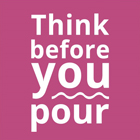
The Think Before You Pour campaign is a similar awareness initiative asking you to think before you pour fats, oils, and grease down the sink and to pop them in the bin instead. Vegetable oil and animal fats known as FOGS (fats, oils and greases) used in cooking may be liquid after use, but they can harden inside pipes when poured down the sink. This causes blockages in pipes, leading to problems in our households, wastewater systems, and marine environment.
The Think Before You Flush campaign as well as the Think Before You Pour campaign, are operated by An Taisce’s Clean Coasts programme in partnership with Irish Water, and aims to raise public awareness of this problem across Ireland.
Go Plastic Free
At Clean Coasts we are constantly trying to raise further awareness about the global issue of plastic pollution and ask people to stop opting for single-use plastic. Ireland has some of the most diverse and spectacular coastlines in the world. However, excessive use of plastic is not only damaging its image and polluting Irish oceans and seas, but it is also threatening our marine wildlife and people’s health.
Recent statistics show that Ireland is the number one plastic waste producer in the European Union and over a third of all produced plastic, such us straws, shopping bags or bottles, is used only once and then discarded. Approximately 9 million tons of plastic waste enter our ocean each year. Plastic generally takes between 450 and 1,000 years to decompose and plastic waste is suffocating our ocean.
The good news is – there is a solution to this crisis!
Are you looking for some inspiration on why you should end your relationship with single use plastic and how to do it?
We created this No More Plastic! brochure that you can download by clicking on the image or the button below!
Learn about the ocean and more…
If you don’t want to or can’t get out at all, that’s okay too! You can learn about the ocean and our coast instead.
It’s very easy to find useful resources online, from podcasts, books and documentaries. In 2020, Clean Coasts has held some interesting online talks on topics that range from Jellyfish in Ireland to the link between climate change and coastal heritage, to beachcombing in Ireland, to what lives on our seashore. You can watch videos of these talks on our YouTube channel.
You can also read stories from Clean Coasts officer and Clean Coasts communities around Ireland, along with some environmental tips on our blog…or why not try to write a story yourself about your own connection to the ocean?!
If you’d like to get involved send us an email at cleancoasts@eeu.antaisce.org






